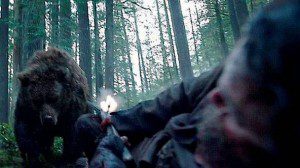
John Fitzgerald says that God is a squirrel.
That’s what a buddy told him, at any rate. When his friend was cold and alone and at the edge of death, he prayed. For maybe the first time in a long time, he prayed.
“He told me he found God,” says Fitz (played in The Revenant by the Oscar-nominated Tom Hardy). And he pauses for the punchline. “Turns out, he’s a squirrel. Big ol’ meaty one.” And his friend “shot and ate that son of a b–ch.”
There’s perhaps more truth in that statement than Fitz knows. In the terrible, beautiful world of The Revenant, God seems nowhere and everywhere. He’s at once wholly disinterested and yet permeating every tree, every snowflake, every drop of blood. In The Revenant, Director Alejandro González Iñárritu has given us a paradox: A movie that feels both Darwinian and supernatural, a world where random chance and divine purpose seem, at time, to hold hands.
Not unlike our own.

A Bear of a Day
One of the most perplexing challenges to faith is among the most obvious: A Christian might thank God for, say, pushing his cancer into remission. The skeptic asks, wouldn’t it be better if God didn’t give cancer in the first place?
You get that same vibe from what sets The Revenant in motion: The bear attack on Hugh Glass (Oscar-nominated Leonardo DiCaprio). Glass, trying to find a good way back to the safety of Fort Kiowa, gets between a mama bear and her cubs. You can’t blame Glass: It was an accident. You can’t blame the bear: She was just doing what bears do. I suppose you could blame it on the socio-political climate of the day—a European yen for fur and national rivalries and Manifest Destiny and all—but that’s taking things a little too far, don’t you think? No, this was a moment of horrible happenstance. As if the universe decided to squish Glass like an ant.
Only Glass didn’t squish. Not completely, anyway. He lived—much to the marvel and, frankly, consternation of the other fellows in his party. And Fitz is particularly put out.
Fitz is a pragmatic man, as one would have to be to some extent in the harsh, danger-filled wilds of early America. His god, such as it is, is his own strength and wits. Out here, it’s been “survival of the fittest” long before Darwin’s followers popularized the phrase. And Fitz believes it’d be best to just let Glass die. And if he refuses … well, best to finish the job the bear started.
Fitz is the bad guy here, for sure—and yet, thanks to Hardy’s magnificent performance, you totally understand him, too. Fitz’s actions might even be justifiable. They certainly are for Fitz. “The greatest good for the greatest number,” utilitarian philosopher Jeremy Bentham was saying across the Atlantic at the time. What good was Glass’s truly miserable life doing for anyone but threatening the lives of other, perfectly healthy people?
In this world—Fitz’s world—there is no greater morality than self-preservation. In his own religion, there is nothing higher, nothing more precious. And Fitz places his faith in Fitz.
“I ought to be God to you!” He thunders when someone dares defy him. “God giveth, and God taketh away.”
But Glass does not worship at the altar of Fitz. For him, truth lies elsewhere.

The Broken Church
“As long as you can still grab a breath, you fight,” Glass tells his son in flashback. “You breathe. Keep breathing.”
Breath is a huge deal in The Revenant. Iñárritu draws your attention to it again and again—ragged, raw, stubborn. Sometimes, it seems, that a corpse is the thing breathing—as if it was still alive.
Breath and life. God breathed life into Adam, we’re told. In Job we hear “The Spirit off God has made me, and the breath of the Almighty gives me life.” In a letter to Timothy, Paul says that “All Scripture is breathed out by God.” The words live.
To live is not a merely a habit of biology. It is a spiritual exercise. With each breath, we acknowledge the gift. And we’re loathe to part with it, even when it seems it’d be easier.
And yet even when the breath ceases to come, there’s a hope—mysterious and diaphanous, but real still.
Throughout the movie, Glass is visited by ghosts—visions of his dead wife, his dead son. After his wife is killed, lying lifeless in the midst of carnage, Glass sees a bird rise from her chest, escaping from the folds of her clothes. And after his son dies, they reunite in a ruined church—a bell mutely swinging as they embrace. This vision has no noise, no breath, no life. But it is a hope. It is a solace. It is, perhaps, even an anticipation.
And as Glass journeys from death into new life (he is, we assume, the revenant of the title) he’s enveloped in Iñárritu’s brutal, glimmering creation, saturated with snow and sun. A river carries him to safety. A kindly stranger feeds him and nurses him back to a semblance of health. A horse is sacrificed for Glass’s well-being, delivering him from a horde of attackers and its body providing a place of warmth. Rhat horse, in Iñárritu’s hands, becomes yet another symbol of Glass’s rebirth: He emerges from the body naked and bloody as if from the womb, in a world made new with a layer of snow.
If Glass came upon a “big ol’ meaty” squirrel, I think he, like Fitz, would see God in it. But they’d see it far differently. Fitz would destroy that god, leaving himself surpreme. Glass would see the squirrel as a gift—a gift to sustain his own gift of life for another day. Another hour.
Spoiler warning here: In the end of the movie, Hugh Glass—the Revenant come to life to wreak revenge on Fitz, his would-be murderer and the killer of his son—echoes a lesson he learned on his trip from death to life. “Revenge is in the creator’s hands,” he was told. He repeats those words almost verbatim as he allows Fitz to float away. “Revenge is in God’s hands, not mine.”
Glass’s statement isn’t quite as holy as it sounds. He sees, down the river, God’s revenge won’t be long in coming. But it’s still a moment of submission, a moment of understanding.
Where is God in The Revenant? Is He in the Horse? The man? The bear? Ask Glass, and he’ll perhaps shrug his shoulders. It’s a question that perhaps he can’t answer. Perhaps he wouldn’t want to. His understanding is that of Moses standing in awe of the Burning Bush, the bush that said, simply, “I AM.”
God Is, Glass would say. And Glass might not define it more, other to place himself subservient to that one great truth.













